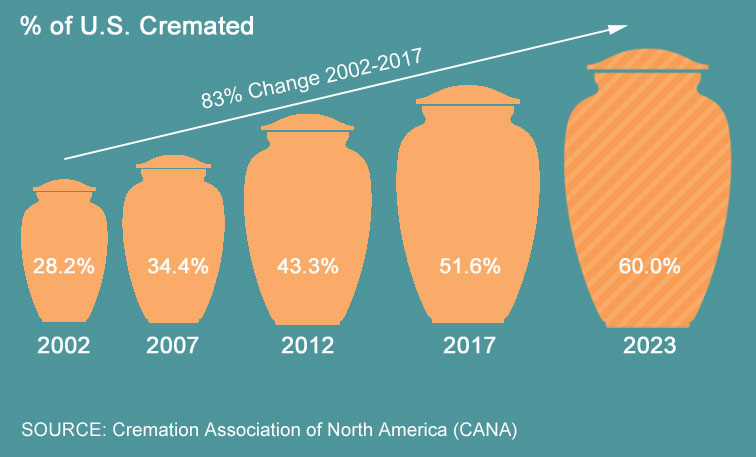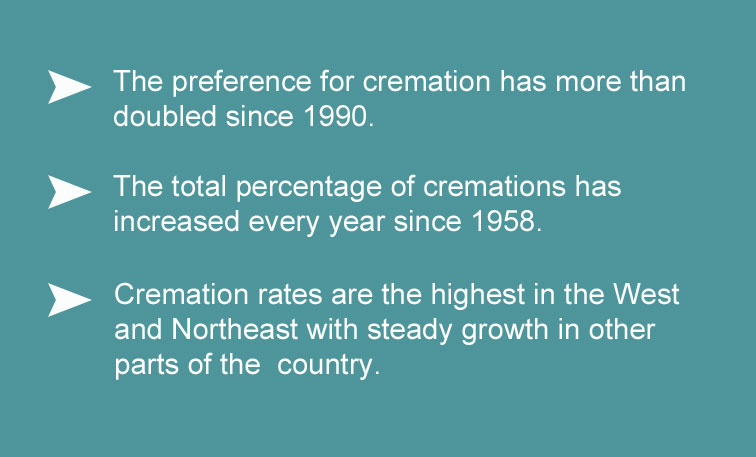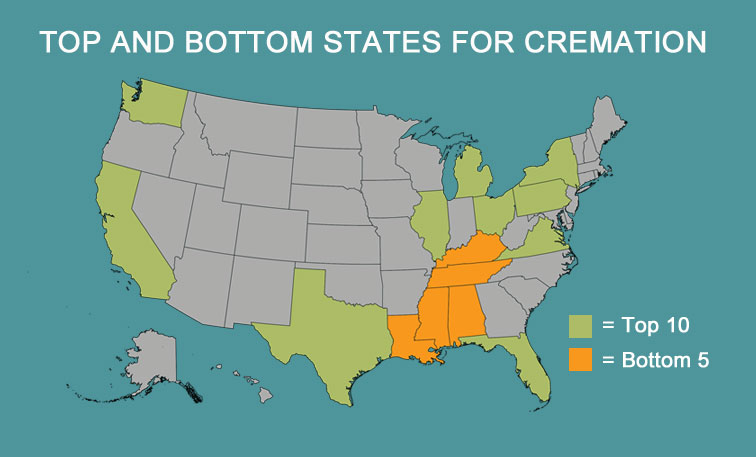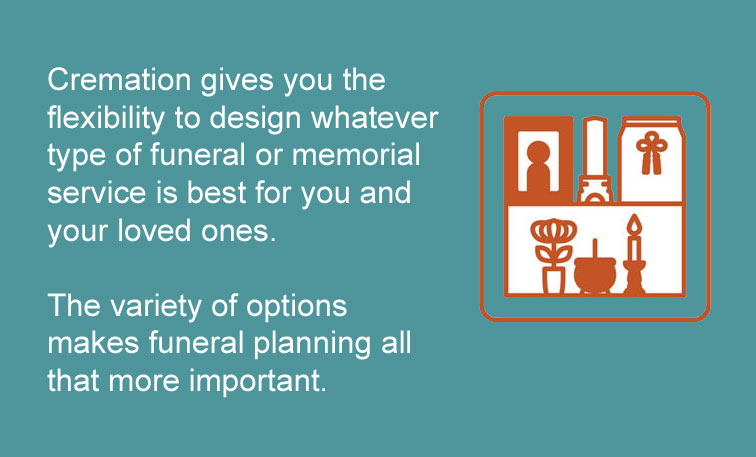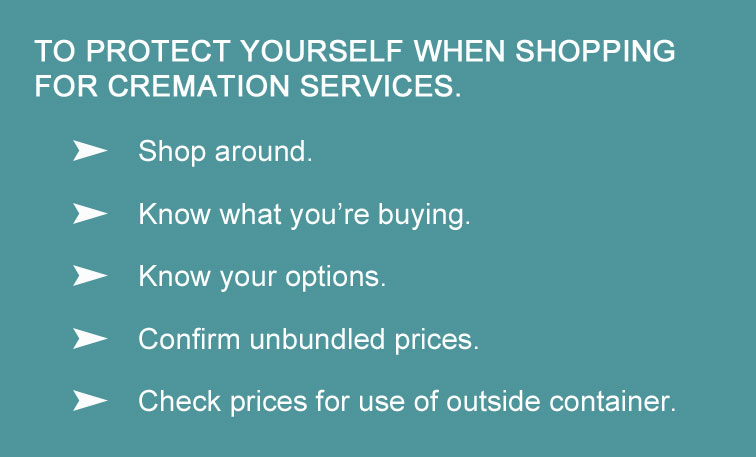Cremation Information: Services, Pricing & Options
For those considering how we would like to have our final remains handled, cremation services have become an increasingly popular option. A recent forecast by the Cremation Association of North America (CANA) anticipates that by 2023 nearly 60% of Americans will choose cremation for their final disposition.
A significant factor in the increasing popularity of cremation is the rising cost of in-ground burial. In addition, many religions and cultures have come to be more accepting of cremation, and society is much less tied to any one place. But, even though it may seem like “everyone” is getting cremated, the choice is not always easy. It is a very personal decision that must be guided by your cultural and religious views as well as your finances. Get a Free Cremation Plan Quote.
Cremation Services: You Have Many Options
A common misconception about cremation is that you cannot have a traditional funeral when you choose cremation. This couldn’t be further from the truth. In fact, you have more memorialization options when you select cremation rather than fewer. Here are just a few of the ways you or your loved one can be honored.
- Hold a funeral with a viewing, with the cremation held after.
- Have a funeral without a viewing, with the cremation to be held after.
- Hold a memorial service at a traditional funeral home followed by an interment of the ashes.
- Have a memorial service at an outside venue.
- Scatter the ashes at a location with meaning to the deceased.
With so many options, planning in advance becomes all the more critical. This is especially true since the cost of your cremation will be determined largely by the type of service you choose. For example, if you opt for a viewing, the body will need to be embalmed, and some kind of casket will also be required.
Get a Cremation Plan QuoteThe point is–when you choose cremation, you can have whatever type of service you would like. However, if your loved ones don’t know what you want, they may make a decision that doesn’t consider your preferences. Preplanning can help you make the decision that’s right for you and take the burden off your loved ones when the time comes.
How to decide if cremation is right for you
Only you can decide if cremation is how you would like to have your body cared for. The decision depends on financial considerations, but it should also take into account the practices of your religion and culture. Consider your options and think about the following questions when making this difficult decision. Remember, there is no right or wrong answer–only the right choice for you.
Questions To Ask When Considering Cremation Services
For many people, the tenets of their faith will guide their decisions. The positions of the various denominations and sects vary widely. Some religions forbid cremation. For others, it is the preferred method. A growing number of religions leave it up to the individual to decide.
If you are trying to decide whether cremation services are right for you, and you have questions about your religion’s stance on the practice, we recommend that you consult with your pastor, priest, or spiritual advisor. For information on some individual religions and sects, visit our Cremation and Religion page.
Cremation services can be much less expensive than in-ground burial. But be sure that you consider all of the costs associated with the type of funeral or memorial ceremony you would like when comparing prices. Many factors go into the exact cost, and prices can vary widely from state to state and city to city. Even within your local area, prices will vary depending on the provider. It pays to shop around. The exact portfolio of services you choose will play a big part in determining the overall price for the cremation you have in mind.
Cremation and in-ground burial both involve processes that work on the body. For cremation, the process uses heat. In burial, the process is decomposition. For more information on the technical aspects of cremation, visit our page on The Cremation Process.
Perhaps your family has a history of using one or the other process. If this is the case, you should consider how important it is to carry on family traditions.
For many of us, the decision is entirely our own. For others, it is important to consider the opinions of other family members. If your family’s feelings are important to you, talk with them to get their feedback.
What to do with the ashes
Ashes can be buried, scattered, or kept in an urn. The crematory will deliver the remains in a temporary or permanent container, such as an urn, that you provide. Cemeteries provide several options for interring cremated remains, including plots for burial and “niches” in a columbarium. They also offer gardens for scattering. See Cemeteries for more on this. Tiny containers, designed to be worn as jewelry, are also available to hold only a small portion of ashes.
State and local laws govern the scattering of ashes on public and private land and at sea, but private companies offer many scattering options. One can choose to be scattered over a favorite area or onto a tranquil body of water. A loved one’s cremated remains can also become part of an artificial reef when placed in the ocean. It’s even possible to have ashes blasted into outer space.
Cremation and the Environment
Cremation is considered less damaging to the environment than a traditional burial. But even cremation is far from perfect in terms of sustainability.
A key criticism of traditional burial is the use of embalming. Burial leaves behind more than 800,000 gallons of formaldehyde each year. It also leaves behind tons of steel and other metals, concrete, and wood. While cremation doesn’t leave behind the vast stores of materials that burial does, cremation facilities consume a large amount of energy and release greenhouse gases and other harmful elements, such as mercury, into the atmosphere.
Choosing “green” options such as a renewable, non-toxic container for the body and selecting a biodegradable urn can lessen the impact on the environment.
If you are concerned about releases from the crematorium, check with your facility to see what measures they are taking to minimize this impact. You can also request that they purchase carbon credits to offset the impact of your cremation.
If leaving little or no ecological impact is important to you, you may want to consider some of the newer options, such as natural forest burials.
As society becomes more aware of the impact of all types of body handling on the environment, new methods considered less harmful to the environment are being introduced. Alkaline Hydrolysis, for example, uses a process of water, heat, and lye to treat the remains. While the process is not currently legal in all states, it has gained traction as an environmentally responsible alternative.
Cremation Services: Understanding the Costs & Prices
Many factors go into the prices you are quoted for cremation services. Prices can vary widely from state to state, city to city, and even from provider to provider within your local area. Shopping around can yield significant results since the exact portfolio of cremation services you choose will play a big part in determining the overall price. For example, a full funeral with the body present will cost more than one with an urn on display since embalming will likely be required.
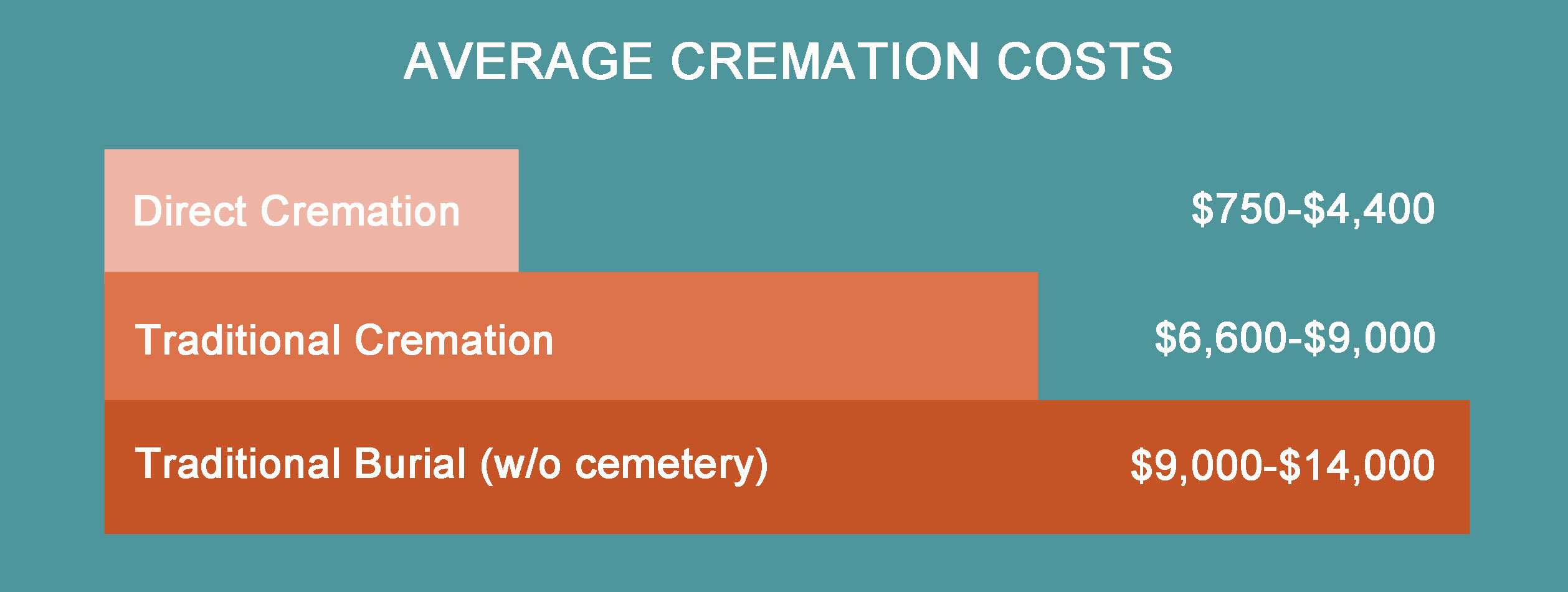
A direct cremation is a simple cremation with no funeral or memorial service. The deceased is transported directly to the crematorium, and the cremated remains are returned to the family. This type of cremation is the most economical.
Did you know that our online funeral planner can provide you with a detailed cremation costs estimate?
The Quick Plan offers a broad price. Be sure to save your Quick Plan in order to be automatically upgraded to the FREE Essentials version.
On the other hand, traditional cremation typically refers to a cremation that includes a memorial service or funeral (the body is present). Like direct cremation, the cost includes actual cremation costs and the price for the memorial service or funeral. It is more challenging to calculate a general cost estimate for a traditional cremation because you have many options for the type of service you have. For example, if you plan to have a funeral along with the cremation, you may be required to purchase embalming.
Questions to Ask About Cremation Costs
When shopping for cremation services, make sure that you are comparing apples to apples. Providers may refer to services differently, and packages may not include the same options. Some key questions to ask about the quote you receive include:
- Is the price for a direct cremation or a traditional cremation?
- What does the price include? For example, are transportation services included? What other extras are required?
- Is the cremation container included?
- Is the final resting place for ashes included?
- Does the price include the crematory fees?
- Are state and local taxes included?
- Is a memorial service included? If so, what elements of the service are included?
Your Rights as a Consumer of Cremation Services
Each state has somewhat different regulations concerning specific funerary practices, such as embalming and using a funeral director. Still, the Federal Trade Commission (FTC) offers protection against sales practices that make it difficult to shop for funeral products.
Under The Funeral Rule, you are entitled to get pricing upfront, buy caskets and urns from third-party sellers, and use an alternate container for cremation. There should be no pressure to buy certain items, and you are always entitled to get pricing upfront and over the telephone.
A common complaint about the funeral industry is that funeral homes and cemeteries are less than transparent with their pricing. While the industry is working to eliminate these types of practices, you can do things to protect yourself.
- Shop around: Prices can vary widely, so be sure to get quotes from more than one cremation service provider.
- Know what you are buying: Ask for specifics on what the quote you receive includes. In particular, does the price include the cremation itself, or is it just for items such as the container and handling of the body?
- Know your options: Make sure that the pricing you receive is comprehensive. For example, does the list include pricing for a “simple” no-frills cremation, or is it a bundled package that includes add-ons?
- Confirm unbundled prices: When receiving package prices, request a list of unbundled pricing. You may be able to eliminate certain elements and lower your cost.
- Check prices for using an outside container: You are entitled to use containers that you do not purchase directly from the funeral home or crematorium. Be sure you inquire about this option.


